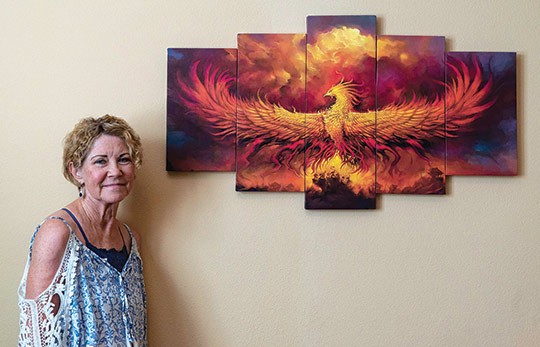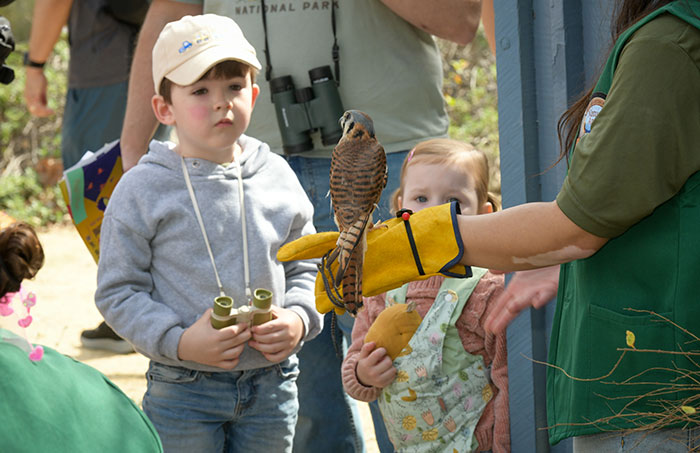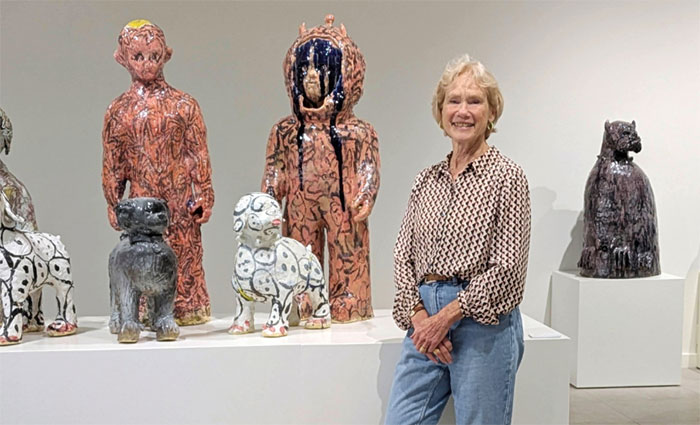Completely incapacitated, her recovery was about revival

by Mick Rhodes | mickrhodes@claremont-courier.com
It was the day after Christmas 2019, and 67-year-old Claremont resident Terry Wilhelm was curled up on the living room floor of her Village townhouse, unable to move.
Scared, bewildered and alone, she managed to call for an ambulance, crawl to the front door and unlock it.
After that, her memory goes dark for about six months.
Arriving EMTs transported her to Pomona Valley Hospital Medical Center, where doctors diagnosed a rare “aneurysmal subarachnoid hemorrhage.” The bleeding from the aneurysm occurred in the space surrounding her brain, and the resulting pressure caused a stroke.
She would spend the next two weeks in the intensive care unit at Pomona Valley before being moved to a recovery room for another 14 days.
The situation was dire; she couldn’t talk, walk, feed, clean or dress herself, and had difficulty holding her head up.
Doctors told her daughter Holly, 43, and son Toby, 39, to prepare for the worst; she would likely never again walk, talk or be self-sufficient in any way, they believed.
It was a daunting prognosis. But Ms. Wilhelm’s will, her children knew, was not to be discounted.
Still completely incapacitated, she was transferred to the skilled nursing wing at Claremont Manor. Her memories of the three months spent there are largely nonexistent. Her daughter told her later that she “spent most of my time just hunched over in my wheelchair.”
After a successful surgery to install a stent to relieve the pressure on her brain, she began extensive rehabilitation at Casa Colina in Pomona.
Still though, the care she required, “was at a level an infantile person has to have,” Ms. Wilhelm said.
And that care was very expensive.
In the meantime, her monthly mortgage bills—on both her townhouse and her son Toby’s Pomona condo—continued to roll in. Her pension helped, but those costs, along with those for her rehabilitation, skilled nursing care, and ever-mounting medical bills, quickly became untenable. Something had to give.
Luckily, she had set up a living trust, will, and established her daughter Holly as her trustee shortly after retiring in 2013 from a rewarding career as a teacher, principal and educational administrator.
“The doctors told her that I would never improve,” Ms. Wilhelm said. That “I would never be able to live alone, that I would always need this very high level of skilled nursing. So, just so she would have enough money, she ended up selling my townhouse and my car, and she had an estate sale company come in and they sold every possession I owned in the house.”
Holly then found a women’s only facility in Upland, Asher Estate. The grounds reminded Ms. Wilhelm of her townhouse’s private yard, which she had adored.
Months went by. Then, inexplicably, with great care, the full force of her significant will—and no small measure of luck—she started to get better.
The turning point came in mid-May, 2020.
“It was like I woke up one day. It was so bizarre,” Ms. Wilhelm recalled. “I could carry on conversations. I shocked the staff by leaving my bedroom and showing up in the kitchen and starting a conversation with them, walking on my own.”
She then began outpatient physical, occupational and speech therapy at Casa Colina.
Though she still had quite a long way to go to gain her independence, she had by then already shattered all physical and cognitive expectations.
Pre-stroke, she had always been a reader and writer. Mercifully, reading was a skill that returned shortly after she moved into Asher Estate.
Soon she began devouring brain research literature in earnest. She stumbled upon “Brain HQ,” by Norman Doidge, one of the preeminent researchers on brain plasticity. She credits his brain training programs as aiding immensely in her recovery.
“Reading his books gives you a lot of hope, because you realize the brain actually can reinvent itself. And the parts of the brain that were damaged, other parts of the brain can sort of step in and take over. It’s just fascinating.”
Further signaling her remarkable march toward reclaiming her life, within a couple months she relocated again, this time to her own studio apartment at Claremont Place.
Of course, all this took place against the backdrop of the coronavirus pandemic.
“It was like Rip Van Winkle waking up, and you wake up to this nightmare,” she said.
She continued her remarkably steady improvement at Claremont Place, becoming more and more independent as the months went by.
Then, in the fall of 2020, she decided it was time for a powerfully symbolic next step.
In November she moved into a smart, newish condo just west of the Village in the Claremont Walks development. Eighteen months after her aneurysm and stroke, Ms. Wilhelm spent her first night on her own.
She still has short-term memory issues, but in many ways has been reborn. She’s out dancing to live music again and taking part in her beloved poetry and writing workshops.
She’d been journaling for decades prior to her stroke, and is now considering turning her recovery writings into a self-published book, with the hope it may prove helpful to other aneurysm and/or stroke victims.
She’s also getting back into photography, and is currently working on getting back behind the wheel of a yet to be purchased car.
Thankfully, paying for the very expensive skilled nursing care she required during the early part of her recovery did not exhaust the nest egg provided by the liquidation of her previous assets, and her pension too is ongoing. She’s now planning to buy another home, hopefully in or near the Village.
“I’m very fortunate, and very grateful for the medical care that I got, and for my daughter, who pushed for me and took care of all my affairs during that time that I was completely out of it,” she said. “It is important to me to be physically active. I have local friends who love to come to the music scene. That’s really helped a lot too, to be active in the community. And there isn’t a better place to be [than Claremont] in terms of the music community for sure. So many opportunities to hear good music, and now they’ve started up Friday Nights Live again. And I’m sure that Last Name [Brewing] will keep having events.
“And I have friends that love to do that stuff. So, I’m very, very fortunate to have the friendships that I have, to be able to live where I live, in this beautiful little townhome in this lovely complex in Claremont. I’ve had such good fortune.”
Lately she’s taken a multi-panel image of a phoenix rising she found on Etsy as a symbol of her recovery journey.
“I look at it as a metaphor for this phase of my life,” Ms. Wilhelm said. “That thing just helps me. It lifts my spirits. Because I’ve got just the ashes of my life since the stroke, and I’m just determined to rise above them.”







0 Comments